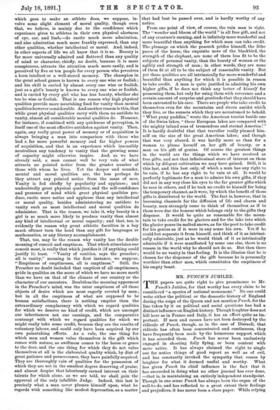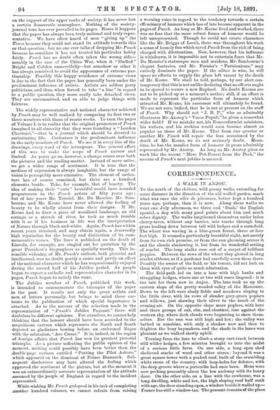MR. PUNCH'S JUBILEE.
THE papers are quite right to give prominence to Mr. Punch's Jubilee, for that worthy has every claim to be considered "a species of national monument." No one could write either the political or the domestic history of England during the reign of the Queen and not mention Punch, for the line taken by it on political and social questions has had a distinct influence on English history. Though laughter does not kill here as in France and Italy, it has an effect quite as im- portant. If men and causes have not been destroyed by the ridicule of Punch, though, as in the case of Disraeli, that ridicule has often been concentrated and continuous, they have frequently been made by the humorous support which it has accorded them. Punch has never been exclusively engaged in shooting folly flying, or been content with mere satire. It has always claimed the right to single out for notice things of good report as well as of evil, and has constantly invoked the sympathy that comes by laughter for what it deemed useful and worthy. What has given Punch its chief influence is the fact that it has succeeded in doing what no other journal has ever done, —that is, in maintaining an entirely independent standpoint. Though in one sense Punch has always been the organ of the well-to-do, and has reflected to a great extent their feelings and prejudices, it has never been a class paper. While relying
on the support of the upper ranks of society, it has never lost a certain democratic atmosphere. Nothing of the society- journal tone has ever prevailed in its pages. Hence it happens that the paper has always been truly national and truly repre- sentative. We have often beard of men "giving up" the Times because.they could not stand its attitude towards this or that question ; but no one ever talks of dropping Mr. Punch because he considers it has not treated his particular hobby fairly. Punch has no doubt often taken the wrong side— notably in the case of the China War, when it " libelled " Bright and Cobden unmercifully—but somehow or other it has always contrived to avoid the appearance of extreme par- tisanship. Possibly this happy avoidance of extreme views is due to the fact that the paper has generally been under the predominant influence of artists. Artists are seldom party politicians, and thus, when forced to take " a line" in regard to a public question, they more easily take detached views. They are uncommitted, and so able to judge things with fairness.
• The widely representative and national character achieved by Punch may be well realised by comparing its first two or three numbers with those of recent weeks. To turn the pages of Volume I. is to realise that the original promoters of Punch imagined in all sincerity that they were founding a " London Charivari,"—that is, a journal which should be devoted to caricaturing life. Caricature is the predominant influence in the early numbers of Punch. We see it in every line of the drawings, every word of the letterpress. The general effect of this was to make the scope of Punch narrow and limited. As years go on, .however, a change comes over both the pictures and the reading-matter. Instead of mere satire, we get a wider range of sentiment. It is true that the medium of expression is always laughable, but the range of vision is perceptibly more extensive. The element of carica- ture has of course remained, but there are a hundred elements beside. Take, for example, that of beauty. The idea of making their " outs " beautiful would have sounded .preposterous to the Punch artists of fifty years ago ; but of late years Mr. Tenniel, Mr. Du Manner, Mr. Sam- bourne, and Mr. Keene have never allowed the feeling of beauty to be wholly absent from their designs. If Mr. Keene had to draw a piece of woodland landscape, an old cottage, or a stretch of river, he took as ranch trouble with it as if his business in life was the interpretation of Nature through black-and-white. Again, Punch has within recent years obtained, and may obtain again, a deservedly high reputation for the beauty and distinction of its com- memorative verses. The lines it published on the death of Lincoln, for example, are singled out for quotation by the great President's biographers as specially worthy. This in- sensible widening of Mr. Punch's outlook, both pictorial and intellectual, was no doubt partly a cause and partly an effect of the national character which he has unquestionably enjoyed during the second half of his Jubilee period. As people began to expect a catholic and representative character in its pages, Punch began to satisfy the want.
The Jubilee number of Punch, published this week, is intended to commemorate the triumphs of the paper in the past. It recalls not only the great artists and men of letters personally, but brings to mind those car- toons to the publication of which special importance is attached. As to the success of the selection made in the representation of ",Punch's Jubilee Pageant," there will doubtless be different opinions. For ourselves, we cannot help thinking that the honour should have been accorded to the magnificent cartoon which represents the North and South depicted as gladiators bowing before an enthroned Negro with the salutation, "Ave Caesar." It is, indeed, in the region of foreign affairs that Punch has won its greatest pictorial triumphs. As a picture reflecting the public opinion of the moment, nothing could possibly have been better than the ,double-page cartoon entitled " Putting the Pilot Ashore," which appeared on the dismissal of Prince Bismarck. Sub- sequent -disclosures may have altered the feeling which approved the sentiment of the picture, but at the moment it was an extraordinarily accurate representationeaf the attitude sasamed by the people of England in regard to the incident represented.
While wishing Mr. Punch godspeed in his task of completing another hundred volumes, we cannot refrain from raising
a warning voice in regard to the tendency towards a certain effeminacy of humour which has of late become apparent in the pages of Punch. As long as Mr. Keene lived and worked, there was no fear that the more robust forms of humour would be left unrepresented. Though he could not create characters like the Mr. Briggs of Leech, there was throughout his work a sense of homely fun which saved Punch from the risk of being; charged with dilettantism. Now, however, that his influence- is withdrawn, it is impossible not to entertain fears that Mr. Du Maurier's statuesque men and maidens, Mr. Sainlxnune'a elegant fantasies, and Mr. Furniss's " Parisianisms," may entirely dominate the paper. If the editor is wise, he will spare no efforts to supply the place left vacant by the death of Mr. Keene. We shall be told, perhaps, by our alert con- temporary that this is not unlike declaring that no efforts ought to be spared to secure a new Raphael. No doubt Keenes are not to be picked up at a moment's notice; still, if an effort is made to represent the particular form of humour which attracted Mr. Keene, his successor will ultimately be found._ We are not sure, indeed, that he is not at present on the staff of Punch. Why should not " J. B. P.," who so admirably illustrates Mr. Anstey's " Voces Populi," be given a somewhat wider field P If we mistake not, his Nonconformist ministers, his waiters, and his urchins would soon become almost as popular as those of Mr. Keene. That from one quarter or another Mr. Punch will repair the loss occasioned by the death of Mr. Keene, we do not seriously doubt. Mean- time, he has the manlier form of humour in prose admirably represented by Mr. Anstey. As long as Mr. Ansley gives us. work like the recent " More Pot-Pourri from the Park," the success of Punch's next jubilee is assured.



















































 Previous page
Previous page